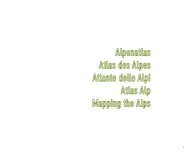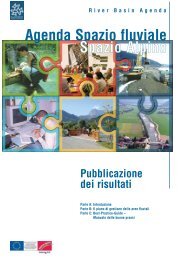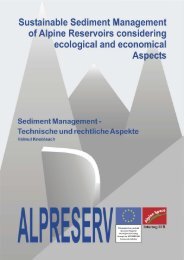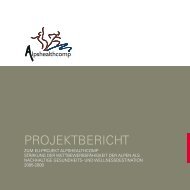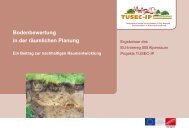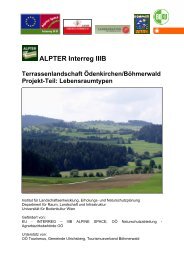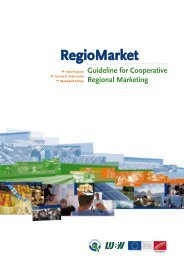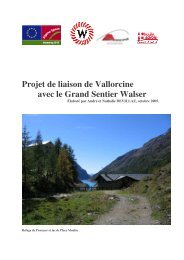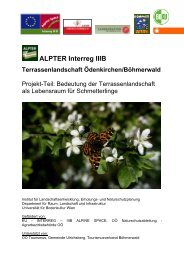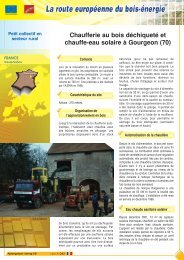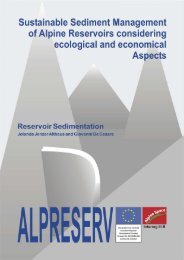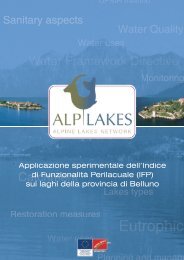WALSERSPRACHE - The four main objectives of the Alpine Space ...
WALSERSPRACHE - The four main objectives of the Alpine Space ...
WALSERSPRACHE - The four main objectives of the Alpine Space ...
You also want an ePaper? Increase the reach of your titles
YUMPU automatically turns print PDFs into web optimized ePapers that Google loves.
Kurt Wanner<br />
by Dino Vasina. In Rimella too an entire group <strong>of</strong> authors went to work under <strong>the</strong> guidelines<br />
set by Marco Bauen. Of great interest was also a dictionary from Bosco Gurin, which shows<br />
a long list <strong>of</strong> Italian loan words. Tobias Tomamichel had published a book on this Walser settlement<br />
back in 1953, followed by three publications by Emily Gerstner-Hirzel. Walsers in <strong>the</strong><br />
Grey Cantons: Davos, Rheinwald, Schanfigg, Prättigau and Obersaxen. Valentin Bühler gave<br />
his native village <strong>the</strong> first Walser dictionary ever in <strong>the</strong> 19 th century: «Davos in its Walser<br />
Dialect», in <strong>four</strong> volumes. Roughly 100 years latter appeared <strong>the</strong> first <strong>of</strong> <strong>the</strong> newly belaboured<br />
Walser dictionaries, <strong>the</strong> «Davos Dictionary» by Martin Schmid and Gaudenz Issler. As an<br />
appendix to this dictionary <strong>the</strong>re appeared in 1986 a list <strong>of</strong> words by Christian Patt. In 1987<br />
appeared <strong>the</strong> dictionary <strong>of</strong> <strong>the</strong> dialect from Rheinwald compiled by Christian and Tilly Lorez.<br />
<strong>The</strong> former also contributed a doctoral dissertation to <strong>the</strong> fur<strong>the</strong>ring <strong>of</strong> Walser language and<br />
culture. In 1991 appeared <strong>the</strong> collectively compiled dictionary <strong>of</strong> <strong>the</strong> dialect from<br />
Prättigau. In <strong>the</strong> fall <strong>of</strong> 1995 came one fur<strong>the</strong>r dictionary by Maria Ettlin-Janka, about<br />
<strong>the</strong> dialect <strong>of</strong> Obarsaxar. How one can best put a dictionary to use is aptly described in<br />
a 1989 essay by Erika Hössli entitled «Working copybook for <strong>the</strong> discovery <strong>of</strong> language in<br />
itself and by itself».<br />
In Vorarlberg, until now just a tiny Walser valley … <strong>The</strong> dialect <strong>of</strong> <strong>the</strong> Walsers from <strong>the</strong><br />
Principauté <strong>of</strong> Liechtenstein has not been recorded in any dictionary to this day. <strong>The</strong>re is<br />
just a 1980 publication by Arthur Gassner about <strong>the</strong> Walser dialect from Triesenberg.<br />
Alexander Frick supplies additional information about <strong>the</strong> same dialect, along with<br />
Engelbert Bucher. For <strong>the</strong> region <strong>of</strong> Vorarlberg <strong>the</strong>re appeared isolated word lists and a twovolume<br />
«Dictionary <strong>of</strong> <strong>the</strong> Vorarlberg, inclusive <strong>of</strong> <strong>the</strong> Principauté <strong>of</strong> Liechtenstein». Tiburt<br />
Fritz gave us a «Small Dictionary <strong>of</strong> <strong>the</strong> Dialect <strong>of</strong> Kleinwalsertal». He was aided by Werner<br />
Drechsel and Karl Kessler. In conclusion, we would like to make some remarks about an<br />
essay entitled «<strong>The</strong> Contemporary Situation with Dialects», included in <strong>the</strong> above mentioned<br />
«Small Dictionary». In it we read: «Before <strong>the</strong> start <strong>of</strong> mass tourism, Kleinwalsertal had a life<br />
<strong>of</strong> its own. Now this cosy existence is over. Alongside with all its taunted advantages, tourism<br />
has taken its toll. Each tourist brought his language along. While trying to make <strong>the</strong> stay for<br />
tourists as pleasant as possible, <strong>the</strong> native language was sidelined. As time went by even<br />
natives felt insecure about <strong>the</strong>ir native dialect. <strong>The</strong> tiny valley experienced an avalanche <strong>of</strong><br />
new influences: craftsmen, employees and mixed marriages brought o<strong>the</strong>r mo<strong>the</strong>r tongues<br />
along. TV did <strong>the</strong> rest. It became outdated to speak dialect. To be fashionable, one had to<br />
make himself understandable to all o<strong>the</strong>r stakeholders. And so our dialect went down <strong>the</strong><br />
drain. In lieu <strong>of</strong> <strong>the</strong> old dialects new language ways barge in. Many expressions pertaining<br />
to <strong>the</strong> old rural time fade away and become obsolete at a time <strong>of</strong> mass mechanisation. On<br />
<strong>the</strong> o<strong>the</strong>r hand we witness newly coined words, which stem from today’s highly technological<br />
and industrialised society. Existing words change in meaning and sound. If dialect is<br />
to stand a chance it must be a living creature and constitute no hindrance to communication.<br />
A dialect will live on if it is lived and experienced».<br />
115



